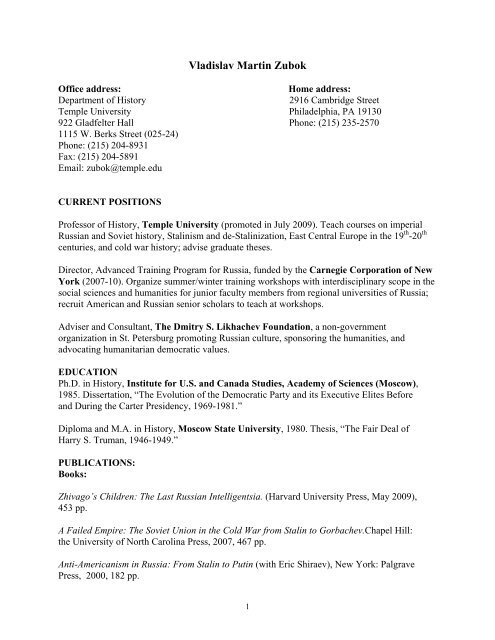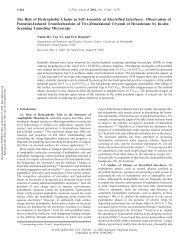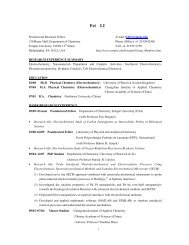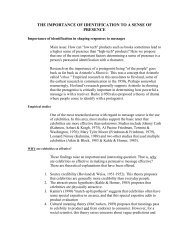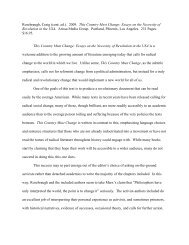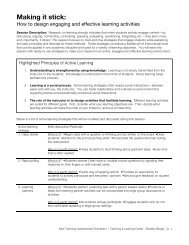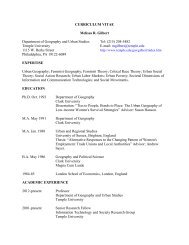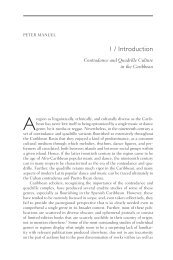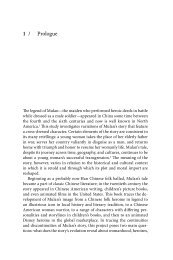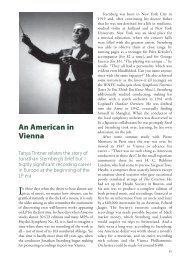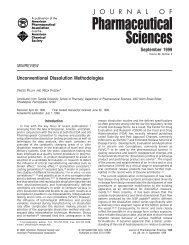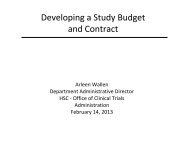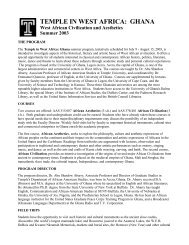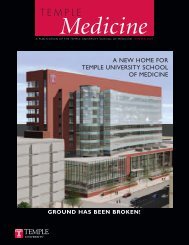Vladislav Martin Zubok - Temple University
Vladislav Martin Zubok - Temple University
Vladislav Martin Zubok - Temple University
You also want an ePaper? Increase the reach of your titles
YUMPU automatically turns print PDFs into web optimized ePapers that Google loves.
<strong>Vladislav</strong> <strong>Martin</strong> <strong>Zubok</strong><br />
Office address: Home address:<br />
Department of History 2916 Cambridge Street<br />
<strong>Temple</strong> <strong>University</strong> Philadelphia, PA 19130<br />
922 Gladfelter Hall Phone: (215) 235-2570<br />
1115 W. Berks Street (025-24)<br />
Phone: (215) 204-8931<br />
Fax: (215) 204-5891<br />
Email: zubok@temple.edu<br />
CURRENT POSITIONS<br />
Professor of History, <strong>Temple</strong> <strong>University</strong> (promoted in July 2009). Teach courses on imperial<br />
Russian and Soviet history, Stalinism and de-Stalinization, East Central Europe in the 19 th -20 th<br />
centuries, and cold war history; advise graduate theses.<br />
Director, Advanced Training Program for Russia, funded by the Carnegie Corporation of New<br />
York (2007-10). Organize summer/winter training workshops with interdisciplinary scope in the<br />
social sciences and humanities for junior faculty members from regional universities of Russia;<br />
recruit American and Russian senior scholars to teach at workshops.<br />
Adviser and Consultant, The Dmitry S. Likhachev Foundation, a non-government<br />
organization in St. Petersburg promoting Russian culture, sponsoring the humanities, and<br />
advocating humanitarian democratic values.<br />
EDUCATION<br />
Ph.D. in History, Institute for U.S. and Canada Studies, Academy of Sciences (Moscow),<br />
1985. Dissertation, “The Evolution of the Democratic Party and its Executive Elites Before<br />
and During the Carter Presidency, 1969-1981.”<br />
Diploma and M.A. in History, Moscow State <strong>University</strong>, 1980. Thesis, “The Fair Deal of<br />
Harry S. Truman, 1946-1949.”<br />
PUBLICATIONS:<br />
Books:<br />
Zhivago’s Children: The Last Russian Intelligentsia. (Harvard <strong>University</strong> Press, May 2009),<br />
453 pp.<br />
A Failed Empire: The Soviet Union in the Cold War from Stalin to Gorbachev.Chapel Hill:<br />
the <strong>University</strong> of North Carolina Press, 2007, 467 pp.<br />
Anti-Americanism in Russia: From Stalin to Putin (with Eric Shiraev), New York: Palgrave<br />
Press, 2000, 182 pp.<br />
1
Inside the Kremlin's Cold War. From Stalin to Khrushchev (with Constantin Pleshakov),<br />
Cambridge, Mass: Harvard <strong>University</strong> Press, 1996, xv + 346 pp. Winner of the Lionel<br />
Gelber Prize for best non-fiction book in English that seeks to deepen public debate on<br />
significant global issues 1996. Published in translation in Germany, Poland, and the<br />
People’s Republic of China.<br />
Books-in-progress:<br />
Conversations with Stalin (with Christian Ostermann and David Wolff). This is a project to<br />
edit, comment on, and publish hundreds of archival records of conversations between Stalin<br />
and foreign visitors in 1944-1953. The manuscript will be ready for a publisher in spring<br />
2009.<br />
Masterpieces of History. The peaceful End of the Cold War in Europe. ed by Svetlana<br />
Savranskaia, Thomas Blanton, and <strong>Vladislav</strong> <strong>Zubok</strong> (Budapest: Central European<br />
<strong>University</strong> Press, 2010)<br />
Crisi e trasformazione dei sistemi politici degli anni Ottanta – Crollo dell’ ultimo impero<br />
(USSR) [Crises and transformations of political systems during the 1980s – The collapse of<br />
the last empire (USSR)] (with Victor Zaslavsky). The manuscript will be ready for a<br />
publisher in December 2008.<br />
A Russian Life: Dmitry Likhachev, a monograph about the nationally-known Russian<br />
historian and the search for national identity in the post-communist Russia.<br />
Edited books, articles, book chapters, and book reviews:<br />
History of Russia. Twentieth Century (in two volumes), ed. Andrei Zubov, Moscow: AST,<br />
2009 – in Russian. I wrote about 250 pages in the 2000-page long volumes.<br />
“The Soviet Union and détente of the 1970s,” Cold War History, Vol. 8, Issue 4 (November<br />
2008), 427-447.<br />
“Russian society and the Prague Spring,” chapter in: Guenter Bischof and Stefan Karner,<br />
eds., Die Sowjetunion, Österreich und die internationale Krise 1968 (Wien, 2008)<br />
“The Destruction of Memory,” review of Orlando Figes, “The Whisperers, Private Life in<br />
Stalin’s Russia,” Washington Post, February 17, 2008.<br />
“German Unification from the Soviet (Russian) Perspective,” commentary on Philip<br />
Zelikow and Condoleezza Rice’s chapter in: Kiron K. Skinner (eds.), with forewords by<br />
Pavel Palazhchenko and George P. Shultz, Turning Points in Ending the Cold War (Stanford<br />
<strong>University</strong>, Hoover Institution Press, 2008), 255-272.<br />
2
Review of Aleksandr Fursenko and Timothy Naftali. Khrushchev’s Cold War: The Inside<br />
Story of an American Adversary. New York: W.W. Norton, February 2006. Published in a<br />
by H-Diplo, October 16, 2007, Roundtable Reviews, vol. VIII, No. 13 (2007), at:<br />
http://www.h-net.org/~diplo/roundtables/#vol9no1.<br />
“La prima crisi della Guerra fredda: Mosca e il petrolio iraniano (1943-1946)” [“The first<br />
crisis of the cold war: Moscow and the Iranian oil”] (with Jamil Hasanli), Ventunesimo<br />
Secolo 13 (June 2007), 11-44.<br />
“Reflessioni sulle Superpotenze passate e presenti: due recenti libri russi,” [“Reflections on<br />
the superpowers past and present: review of recent Russian history books”] Mondo<br />
Contemporaneo 1 (2007), 119-130.<br />
“Soviet Foreign Policy from Detente to Gorbachev, 1975-1985,” chapter for The Cambridge<br />
History of the Cold War, vol. 3 (forthcoming in 2008).<br />
“In Search of Cold War Ideologies,” (with Leopoldo Nuti,), chapter in: Saki R. Dockrill and<br />
Geraint Hughes, eds., Advances in Cold War History (New York-London: Palgrave-<br />
McMillan Press, 2006).<br />
“Gorbaciov e il ruolo della personalita nella storia” [“Gorbachev and the role of personality<br />
in history”], Ventunesimo secolo, 10 (July 2006).<br />
“Unwrapping an enigma: Soviet elites, Gorbachev and the end of the Cold War,” in: Silvio<br />
Pons and Federico Romero, eds., Reinterpreting the End of the Cold War. Issues,<br />
interpretations, periodizations (London: Frank Cass, 2005), 137-164.<br />
Review, Gorlizki, Yoram, and Oleg Khlevniuk. Cold Peace: Stalin and the Soviet Ruling<br />
Circle, 1945-1953 , in Slavic Review, Vol. 64, Number 1 (Spring 2005), 199.<br />
“Russia’s Identity Quest,” Orbis (Winter 2005), 183-193.<br />
“Soft Power. Reagan the dove,” New Republic, (June 21, 2004), 11-12.<br />
Review of Lawrence S. Wittner, “The Struggle Against the Bomb,” H-Peace, May 2004.<br />
The End of the Cold War; New Facts and Aspects, co-edited with S.Yu. Shenin, and A.A.<br />
Shubin (Saratov: Saratov State <strong>University</strong>, 2004).<br />
“Il posto degli Stati Uniti nella propaganda e nella societa sovietica dopo Stalin: l’immagine<br />
del nemico e i fattori della sua erosione,” in: Pierro Craveri e Gaetano Quagliariello,<br />
L’Antiamericanismo in Italia e in Europa nel Secondo Dopoguerra (Rome: Rubbettino<br />
Editore, 2004), 367-386.<br />
“Russian Historiography of the Cold War: Some Results of the Decade,” Otechestvennaia<br />
istoriia, no. 4, 2003, 143-150; no. 5, 139-162 (with V. Pechatnov).<br />
3
“The Brezhnev Factor in Détente, 1968-1972,” in: Natalia Yegorova and Alexander<br />
Chubarian, eds., Cold War and the Policy of Détente: Problems and Discussions (Moscow:<br />
The Institute of General History, 2003), vol. 1, 284-316.<br />
“La Realpolitik del Cremlino e le origini della Guerra fredda” [“The realpolitik of the<br />
Kremlin and the origins of the cold war”], Ventunesimo Secolo. Revista di studi sulle<br />
transizioni (Rome: Luiss <strong>University</strong> Press, Marzo 2003), 35-75.<br />
“Gorbachev and the End of the Cold War: Different Perspectives on the Historical<br />
Personality,” in: William C. Wohlforth, ed., Cold War Endgame: Oral History, Analysis,<br />
Debates (<strong>University</strong> Park, PA: The Pennsylvania State <strong>University</strong> Press, 2003), 207-242.<br />
“Gorbachev and the End of the Cold War: Perspectives on History and Personality,” Cold<br />
War History, Vol. 2, Issue 2 (January 2002): 61-100.<br />
“Was There a Stalin Doctrine of the Cold War? The Issue of War and Peace in Stalin’s<br />
Actions and Theoretical Writings in the Last Years of his Life,” chapter in: Saki Dockrill,<br />
Robert Frank, Georges-Henri Soutou, and Antonio Varsori, eds., L’Europe de l’Est et de<br />
l’Ouest dans la Guerre froide 1948-1953. (Universite de Paris IV, Presses de l’Universite de<br />
Paris Sorbonne, 2002), 161-183.<br />
“Die Krisen Gorbatschows und die Vereinigung Deutschlands,” chapter in: Hans-Hermann<br />
Hertle, Konrad H. Jarausch, Christoph Klessmann (Hg), Mauerbau und Mauerfall.<br />
Ursachen – Verlauf- Auswirkungen (Berlin, Christoph Links Verlag, 2002), 245-268.<br />
"Gorbachev's Nuclear Learning," Boston Book Review, April-May, 2000.<br />
“‘Instead We Are Producing Rockets.’ The Story of the American Exhibition in Moscow,<br />
July 1959,” Rodina, special issue No. 4 on the Cold War, Moscow, 1998, 76-78 (in<br />
Russian).<br />
“‘What Chaos in the Beautiful Socialist Camp!’ Deng Xiaoping and Sino-Soviet relations,<br />
1956 - 1963,” The Cold War International History Project Bulletin, no. 10, March 1998,<br />
152-162.<br />
“Stalin’s Plans and Soviet Archives,” Diplomatic History, Vol. 21, No. 2, Spring 1997, 295-<br />
305.<br />
“The Soviet Intelligence Services in Germany and the Berlin Crisis, 1958-1961” in:<br />
Wolfgang Krieger and Juergen Weber, eds., Spionage für den Frieden? Nachrichtendienste<br />
in Deutschland während des Kalten Krieges, Akademiebeiträge zur politischen Bildung:<br />
Akademie für Politische Bildung, Tutzing (München: Guenter Olzog Verlag, 1997), 121-<br />
144.<br />
4
“The Soviet Union and European Integration from Stalin to Gorbachev,” Journal of<br />
European Integration History, Vol. 2, No. 1, 1996, 85-98.<br />
"‘To Hell with Yalta!’ - Stalin Opts for a New Status Quo,” The Cold War International<br />
History Project Bulletin, No. 6-7, Winter 1995/1996, 24-27.<br />
“Khrushchev’s Nuclear Promise to Beijing During the 1958 Crisis,” The Cold War<br />
International History Project Bulletin, No. 6-7, Winter 1995/1996, 219, 226-227.<br />
"Soviet Intelligence and the Cold War: the ‘Small’ Committee of Information, 1952-1953,"<br />
Diplomatic History, Vol. 19, No. 3, Summer 1995, 453-472.<br />
“A Perspective from Russia” in Peter Gourevitch, Takashi Inoguchi, and Courtney<br />
Purrington, eds., United States-Japan Relations and International Institutions After the Cold<br />
War, (La Jolla, CA: The <strong>University</strong> of California San Diego Press, 1995), 363-378.<br />
"Russia: Between Peace and Conflict," in Hans-Henrik Holm and Georg Sorensen, eds.,<br />
Whose World Order? Uneven Globalization and the End of the Cold War (Boulder, CO:<br />
Westview Press, 1995), 103-118.<br />
"‘Dismayed by the Actions of the Soviet Union’: Mikoyan's Talks with Fidel Castro and the<br />
Cuban Leadership, November 1962,” The Cold War International History Project Bulletin,<br />
No. 5, 1995, 59, 89-92.<br />
“Soviet Activities in Europe after World War II,” Problems of Post-Communism,<br />
September/October 1995, 3-8.<br />
“Atomic Espionage and Its Soviet ‘Witnesses,’" The Cold War International History Project<br />
Bulletin, no. 4, 1994, 50, 52-53.<br />
"Moscow and Nuclear Weapons after Stalin's Death," with Yuri Smirnov, The Cold War<br />
International History Project Bulletin, no. 4, 1994, 1, 14-18.<br />
"Spy vs. Spy: The KGB vs. the CIA, 1960-1962," The Cold War International History<br />
Project Bulletin, no. 4, 1994, 22-33.<br />
"The Collapse of the Soviet Union. Peace, Stability and Legitimacy," in Geir Lundestad, ed.,<br />
The Fall of Great Powers: Peace, Stability and Legitimacy, Nobel Symposium 87 (Oslo:<br />
Scandinavian <strong>University</strong> Press, 1994), 157-174.<br />
“The Soviet Union,” (with C. Pleshakov) in David Reynolds, ed., The Origins of the Cold<br />
War in Europe (New Haven: Yale <strong>University</strong> Press, 1994), 53-76.<br />
"Soviet Union and U.S. Foreign Policy in the 1960's," in Diane Kunz, ed., The Diplomacy in<br />
the Crucial Decade: American Foreign Relations During the 1960's (New York: Columbia<br />
<strong>University</strong> Press, 1994), 149-182.<br />
5
"Offered Hand Rejected? Vance Mission to Moscow in March 1977” in Herbert D.<br />
Rosenbaum and Alexej Ugrinsky, eds., Jimmy Carter: Foreign Policy and Post-Presidential<br />
Years (Westport, CT: Greenwood Press, 1994).<br />
"NSC 68: A Soviet view,” in Ernest May, ed., National Security: NSC 68 (New York: St.<br />
<strong>Martin</strong>’s Press, 1993).<br />
“The Missile Crisis and the Problem of Soviet Learning,” Problems of Communism, Special Edition,<br />
Spring 1992.<br />
“Learning Against the Grain (Soviet Nuclear Mythology).” Peace Review (Winter/Spring 1991).<br />
PREVIOUS POSITIONS<br />
Organizer, “Power and Culture during the Cold War: Parallel Home Fronts,” research<br />
project between <strong>Temple</strong> <strong>University</strong> and the Russian Academy of Science, funded by the<br />
Carnegie Corporation (NY), 2004. Workshop on this project took place at Saratov State<br />
<strong>University</strong>, Saratov, Russia, on July 1-2, 2004.<br />
Coordinator, International Summer Schools Program in Russia (with Svetlana<br />
Savranskaia), funded by Carnegie Corporation (NY), in cooperation with the Kuban State<br />
<strong>University</strong> (Russia), the National Security Archive, and the Informational Bureau of NATO<br />
in the Russian Federation, 2002-2004. The first school, “Regional Aspects of the Cold War<br />
History: Eastern European countries and great powers” took place in Gelendzhik, Russia on<br />
August 6-14, 2003. The second school on the topic “The End of the Cold War and the<br />
Contemporary Problems of International Security” also took place in Gelendzhik, Russia,<br />
June 22-30, 2004.<br />
Senior Research Fellow-in-Residence, The National Security Archive, George<br />
Washington <strong>University</strong>, April 1994 – September 2001.<br />
Director of Russia and East Bloc Archival Documents Database Project of the National<br />
Security Archive, George Washington <strong>University</strong> and Cold War International History<br />
Project, Woodrow Wilson International Center for Scholars, Washington D.C., funded by<br />
Smith Richardson Foundation to create English language catalogue of newly available<br />
documents, 1996 - September 2001.<br />
Director of the Project "Georgia, Armenia, Azerbaijan in the Cold War," The National<br />
Security Archive, George Washington <strong>University</strong>, September 1999 - August 2001.<br />
Fellow, Institute for European, Russian and Eurasian Studies, George Washington<br />
<strong>University</strong>, 1995-1997.<br />
6
Consultant and Co-Director, “Stalin and the Cold War” Project of the Cold War<br />
International History Project, Woodrow Wilson International Center for Scholars,<br />
Washington, D.C., June 1997- August 1998.<br />
Project Co-Coordinator and Consultant, research project and international conference,<br />
“Rethinking the End of the Cold War,” Thomas J. Watson Jr. Institute for International<br />
Studies, Brown <strong>University</strong>, November 1995 - June 1998.<br />
Acting Director, Seminar on Cold War International History, Norwegian Nobel Institute<br />
(Oslo), coordinated meetings of an international group of visiting scholars and the Institute’s<br />
fellows, January – April 1994.<br />
Senior Research Fellow, Norwegian Nobel Institute (Oslo), June - December 1993.<br />
Research Fellow, Kennan Institute for Advanced Russian Studies, the Woodrow Wilson<br />
International Center for Scholars, Washington, D.C., January - May 1993.<br />
Research Fellow, Center for International Security and Arms Control (Stanford<br />
<strong>University</strong>), December 1990 - April 1991.<br />
Research and Senior Research Fellow, Institute for the U.S.A. and Canada Studies of the<br />
Russian Academy of Sciences, 1985-1992.<br />
Fellow, Russian Science Foundation, a Moscow-based, non-governmental research group<br />
uniting young political scientists, historians and economists, 1991-1993.<br />
Coordinator of Research Seminar for senior scholars and government officials, Institute for<br />
the U.S.A. and Canada Studies of the Russian Academy of Sciences, November 1988 -<br />
December 1990.<br />
TEMPORARY TEACHING POSITIONS AND EXPERIENCE<br />
Lecturer, Institutions, Marchets, Technologies (IMT), Institute for Advanced Studies,<br />
Lucca, Italy. Taught graduate course on international relations during the cold war, February<br />
2006 and May 2007.<br />
Lecturer, Libera Universita Internazionale degli Studi Sociali Guido Carli, Rome, Italy.<br />
Taught undergraduate course on the cold war, March-May 2006.<br />
Lecturer and Deputy Director (with James Millar and James Hershberg) of NEH-funded Summer<br />
Institute on New Sources and Findings on Cold War International History, Elliott School for<br />
International Affairs, George Washington <strong>University</strong>, September 1998 – August 1999.<br />
Lecturer on History, <strong>University</strong> of Virginia, January – May 1997. Taught a course on<br />
Russian and Soviet foreign policy in the 20th century for graduate students and Ph.D.<br />
candidates.<br />
7
Guest Lecturer on History, George Washington <strong>University</strong>, in 1995 - 1998. Cocoordinator<br />
of the course “Documenting the Cold War History” (with Christian Ostermann<br />
and the staff of the National Security Archive).<br />
Lecturer on Post-Soviet Politics, The Paul H. Nitze School of Advanced International<br />
Studies, Johns Hopkins <strong>University</strong>, June - August 1996. Taught undergraduate course for<br />
students of Russian language, Summer Political Russian Program.<br />
Lecturer on Politics and History, <strong>University</strong> of Michigan (Ann Arbor), September –<br />
December 1992. Taught undergraduate course on Soviet and post-Soviet government and<br />
politics.<br />
Lecturer on History, Ohio <strong>University</strong>, January – April 1992. Taught (with Steven Minor)<br />
graduate seminar on Soviet-American relations from the Russian revolution to the end of the<br />
Cold War.<br />
Lecturer on History and Politics, Amherst College, September –December 1991. Taught<br />
(with William Taubman) undergraduate course on the Cold War and Soviet-American<br />
relations.<br />
Lecturer on Nuclear History, Stanford <strong>University</strong>, January - April 1991. Taught (with<br />
David Holloway) graduate course on international nuclear history.<br />
Lecturer on Cold War and Nuclear History, Institute for U.S. and Canada Studies,<br />
Academy of Sciences (Moscow), November 1988 - December 1990.<br />
Guest Lecturer at various seminars on Cold War History, Soviet History and International<br />
Relations for students at Princeton <strong>University</strong>, the Russian Research (Davis) Center at<br />
Harvard <strong>University</strong>, Johns Hopkins <strong>University</strong>, Brown <strong>University</strong>, and Georgetown<br />
<strong>University</strong>.<br />
RECENT PRESENTATIONS AT PROFESSIONAL AND PUBLIC MEETINGS:<br />
Commentator, the panel “Waltzing in the Cold War: The Vienna Summit 1961,” the annual<br />
meeting of German Historical Association, October 10, Arlington, VA.<br />
Presentation, the roundtable “Academician Dmitriy Likhachev: A Scholar’s Activism in<br />
Soviet and Post-Soviet Russia,” the annual meeting of the American Association for<br />
Advancement of Slavic Studies, November 22, Philadelphia.<br />
Presentation, “Soviet (Non) Strategy in the Mediterranean during the Cold War,” at the<br />
international workshop “Cold War in the Mediterranean: Connecting the Fronts,” November<br />
14-15, the European Institute, Columbia <strong>University</strong>, New York.<br />
8
Presentation, panel “Cold War Conversations. The 40 th Anniversary of Prague Spring,” the<br />
public conference sponsored by the Cold War Museum, the Embassy of the Czech Republic, and<br />
the Embassy of the Republic of Slovakia, October 11, 2008, Lorton, VA.<br />
Presentation, panel, “Russia and the West,” US Institute of Peace, September 26, 2008,<br />
Washington DC.<br />
Presentation, panel “The Russia-Georgia conflict and the US,” at the Institute of European,<br />
Russian and Eurasian Studies, the Institute for International Economic Policy,<br />
and the George Washington <strong>University</strong>’s Center for International Business Education and<br />
Research, September 11, 2008, Washington DC.<br />
Presentation, panel “Improving US-Russian Relations through Cooperation in Higher<br />
Education and Research,” Kennan Institute, Woodrow Wilson International Center for<br />
Scholars, September 18, 2008, Washington DC.<br />
Paper, “Lost in the Triangle: Japan and the Far East Diplomacy, 1969-1972. New<br />
Documentation about the Soviet-American Backchannel Talks,” presented at the<br />
international conference, “Northeast Asia in the Cold War: New Evidence and<br />
Perspectives,” June 25-27, 2008, Slavic Research Center, Hokkaido <strong>University</strong>, Sapporo,<br />
Japan.<br />
Paper, “Soviet intellectual elites after Stalin’s death and visions of the end of the Cold War,”<br />
presented at the international conference, “Overcoming the Iron Curtain. Visions of the End of<br />
the Cold War in Europe 1945-1990,” June 12-14, 2008, Paris, France.<br />
Paper, “Stalin and Israel,” presented at the international conference “Harry S. Truman, the State<br />
of Israel, and the Quest for Peace in the Middle East,” May 29, 2008, The Hebrew <strong>University</strong> of<br />
Jerusalem, Mount Scopus, Jerusalem, Israel.<br />
Lecture, “Reflections on the end of the Cold war: the role of cultural and intellectual<br />
changes,” the Havighurst Center for Russian and Post-Soviet Studies, Miami <strong>University</strong>,<br />
Oxford, Ohio, April 14, 2008<br />
Lecture, “A Failed Empire? Lessons from the Soviet cold war experience,” Davis Center for<br />
Russian and Eurasian Studies, Harvard <strong>University</strong>, April 8, 2008<br />
Presentation, “Russian society and the Prague Spring,” the Eisenhower Center for American<br />
Studies conference “Prague Spring and Soviet Invasion of Czechoslovakia, 1968,” <strong>University</strong> of<br />
New Orleans, 3-4 April, 2008.<br />
Lecture, “Zhivago's Children: The rise and fall of the intelligentsia after Stalin,” the Institute<br />
of Slavic, East European, and Eurasian Studies, <strong>University</strong> of California, Berkeley, February<br />
13, 2008.<br />
9
Presentation, “The Soviet Union in the Cold War,” Foreign Policy Research Institute,<br />
Philadelphia, November 29, 2007.<br />
Lecture, “Zhivago’s Children: Exploring the Russian Intelligentsia after Stalin,” Princeton<br />
Institute for International and Regional Studies, Princeton <strong>University</strong>, November 15, 2007.<br />
Lecture, “The Soviet Union in the Cold War,” Washington College, November 6, 2007.<br />
Lecture, “Soviet perspective of the Cold War,” Hollybush Lecture, Rowan <strong>University</strong>,<br />
November 1, 2007.<br />
Presentation, “Nikita Khrushchev: Institutional and Personal de-Stalinization,” Nikita<br />
Khrushchev’s Memoirs Symposium, the Watson Institute for International Studies, Brown<br />
<strong>University</strong>, October 27, 2007.<br />
Presentation, Panel of Scholarly Experts, Conference, U.S.-Soviet Relations in the Era of<br />
Détente, 1969-1976, U.S. Department of State, Washington, DC, October 22, 2007.<br />
Lecture, “Space Exploration and the Cold War: A Soviet View,” at Sputnik 50 th Anniversary<br />
Conference, <strong>Temple</strong> <strong>University</strong>, October 5, 2007.<br />
Paper, “Snatching Victory from the Jaws of Defeat: Soviet foreign policy in the Far East and the<br />
Pacific Region, 1985-91,” “Cold War in Asia, 1973-1991.” International Workshop, <strong>University</strong><br />
of Carolina, Santa Barbara, March 21- 22, 2007.<br />
Lecture, “From Lenin to Putin: Is Another Cold War Possible?” Denver World Affairs Council,<br />
March 19, 2007.<br />
Paper, “Who Were ‘Children and Fathers’ in December 1962? The Manege Episode<br />
Reconsidered,” presented at the annual conference of the American Association for<br />
Advancement of Slavic Studies, Washington, DC, November 18, 2006.<br />
Paper, “Soviet society in the 1960s: main trends,” Russian-Italian historical workshop,<br />
Libera Universita degli Studi Sociali, Rome, November 9-10, 2006.<br />
Paper, “The Impact of Hungarian revolution 1956 on Soviet society,” workshop. The Davis<br />
Center for Russian and Eurasian Studies, Harvard <strong>University</strong>, October 30, 2006.<br />
Discussant, Roundtable: Lessons from the History-IR Exchange, workshop “Historical<br />
Legacies in International Affairs,” <strong>Temple</strong> <strong>University</strong>, October 27, 2006.<br />
INTERNATIONAL EDUCATIONAL PROGRAMS<br />
Organizer and lecturer, international and disciplinary training workshop for junior US,<br />
Russian, and CIS-countries faculty in humanities and social sciences “Teaching Russian<br />
Legacy in the Global 21 st Century,” July 17-29, Kichkine hotel, Crimea, Ukraine under the<br />
10
auspices of <strong>Temple</strong> <strong>University</strong> and St. Petersburg <strong>University</strong> (Department of Psychology),<br />
with support of the Russkiy Mir Foundation and Carnegie Corporation of New York.<br />
Organizer and lecturer, international and interdisciplinary training workshop for junior<br />
Russian faculty in humanities and social sciences “Russia and the World in the 20 th Century:<br />
Social-Ethnic Migrations and Nation States,” July 5-17, 2007, St. Petersburg, Russia under<br />
the auspices of <strong>Temple</strong> <strong>University</strong> and St. Petersburg State <strong>University</strong> (Department of<br />
Psychology) with support of Carnegie Corporation of New York.<br />
Organizer and lecturer, international and interdisciplinary training workshop for junior<br />
Russian faculty in humanities and social sciences “Russia and the World in the 20 th Century.<br />
State Power, Society, and ‘Critical’ Personalities,” December 10-22, Moscow, Russia, 2007<br />
under the auspices of <strong>Temple</strong> <strong>University</strong> and the State <strong>University</strong> for Humanities in<br />
Moscow, Russia with support of Carnegie Corporation of New York.<br />
Organizer and lecturer, international and interdisciplinary training workshop for junior Russian<br />
faculty in humanities and social sciences “Russia and the World in 20 th Century: Economic<br />
Modernization and Social-Political Transformations,” 21 July- 2 August 2008, St. Petersburg,<br />
Russia, under the auspices of <strong>Temple</strong> <strong>University</strong> and St. Petersburg State <strong>University</strong><br />
(Department of Psychology) with support of Carnegie Corporation of New York.<br />
MEDIA<br />
Senior Series Consultant (with John Lewis Gaddis and Lawrence Freedman) on CNN-<br />
Jeremy Isaacs Productions’ “Cold War,” a 24-hour documentary series, September 1995 –<br />
December 1998; consultant and on-air commentator for CNN’s “Cold War Postscript,”<br />
appearing on 21 of 24 half-hour episodes, hosted by Ralph Begleiter, September 1998 -<br />
April 1999; and curricula consultant, Turner Learning: produced teaching guides and CD-<br />
ROM to accompany CNN “Cold War” documentary series for distribution to 20,000 high<br />
school and college teachers in the U.S., 1998-1999.<br />
Consultant and On-Air Commentator, “Race for the Superbomb,” PBS and Learning<br />
Channel documentary, air date January 11, 1999.<br />
On-Air Commentator, “Debating the Issues,” one of five half-hour discussion programs<br />
complementing the PBS documentary series “Messengers from Moscow” featuring leading<br />
U.S. specialists on the Cold War, 1996.<br />
AWARDS AND GRANTS:<br />
2008 AAASS Marshall Shulman Prize for A Failed Empire<br />
2008 Public Policy Scholarship, Woodrow Wilson Center, Washington DC<br />
2008 Grant for project, “Teaching Russian Legacy in the Global World<br />
Joint Advanced Training of American and Russian Junior Faculty<br />
in Russian History, Culture, and Language (2008-2009),” Russian<br />
Foundation “Russkyi Mir,” $220,000<br />
11
2008 Research and Writing Grant, Foundation “Russkyi Mir,” $20,000<br />
2007 Fellow, the Rockefeller Center, Bellagio<br />
2007 Grant, Advanced Training Program for Russia,<br />
Carnegie Corporation (NY), $320,000<br />
2006 Fellow, Libera Universita degli Studi Sociali, Rome<br />
2005 Research Fellowship, the Collegium Budapest<br />
2004 Carnegie Corporation (NY) Incentive Grant, $15,000 USD<br />
2003 Presidential Research Incentive Summer Fellowship,<br />
<strong>Temple</strong> <strong>University</strong>, $5,000<br />
1998 Research Grant, the Open Society Archive, Budapest<br />
1996-1997 Database Grant, Smith Richardson Foundation<br />
1997 Research Grant, National Council for Eastern European and Eurasian<br />
Research<br />
1996 Lionel Gelber Prize for Inside the Kremlin’s Cold War<br />
1996 Fellowship, Zentrum fuer Zeithistorische Forschung Potsdam<br />
1993-94 Fellowship, the Norwegian Nobel Institute, Oslo.<br />
1993 Research Grant, The U.S. Institute of Peace<br />
1992 Fellowship, the Kennan Institute<br />
1991-92 Research and Writing Grant, The MacArthur Foundation Program on Peace<br />
and International Cooperation<br />
1991 Karl Loewenstein Fellowship in Political Science and Jurisprudence,<br />
Amherst College<br />
1991 Fellowship, Contemporary History Institute, <strong>University</strong> of Ohio<br />
1989 Grant-in-Aid, Eisenhower Institute of World Affairs<br />
PROFESSIONAL SERVICE<br />
<strong>Temple</strong> <strong>University</strong>, Department of History, member of Graduate Admissions Committee<br />
(also chair in 2004), Graduate Council, Undergraduate Committee, Personnel Committee,<br />
and Chair’s Advisory Board, participated in a number of search committees, 2001-present.<br />
Member of the Center for the Studies of Force and Diplomacy (CENFAD), <strong>Temple</strong><br />
<strong>University</strong>, 2001-present.<br />
Book reviewer for Slavic Review, H-Diplo, and Mondo Contemporaneo<br />
PROFESSIONAL MEMBERSHIPS<br />
American Historical Association<br />
American Association for the Advancement of Slavic Studies<br />
German Historical Association<br />
LANGUAGES: fluent in English and Russian, read German, French, and Italian.<br />
12


